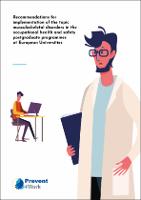Please use this identifier to cite or link to this item:
https://repositorio.usj.es/handle/123456789/672
| Title: | Recommendations for implementation of the topic musculoskeletal disorders in the occupational health and safety postgraduate programmes at European Universities |
| Authors: | Bellosta-López, Pablo


de Brito Silva, Priscila 
Jensen, Palle S. 
Hoegh, Morten S. 

Palsson, Thorvaldur S. 


Christensen, Steffan Wittrup Mc Phee 

Blasco-Abadía, Julia 
Belsué Pastora, Javier 
Berjano, Pedro L. 


Langella, Francesco 


Vanni, Daniele 
Doménech-García, Víctor 

|
| Keywords: | Guidelines of good practices; Occupational health; Work; Musculoskeletal disorders; Low back pain; Ergonomics; European Project; Erasmus+; Prevent4Work; Guía de buenas prácticas; Salud laboral; Trabajo; Trastornos musculoesqueléticos; Dolor lumbar; Ergonomía; Proyecto europeo |
| Issue Date: | 2021 |
| Citation: | Bellosta-López P, de Brito Silva P, Jensen PS, Hoegh M, Palsson TS, Christensen SWM, Blasco-Abadía J, Belsué J, Berjano P, Langella F, Daniele V, Doménech-García V. Recommendations for implementation of the topic musculoskeletal disorders in the occupational health and safety postgraduate programmes at European Universities. Villanueva de Gállego: Universidad San Jorge; 2021. Available from: https://doi.org/10.54391/123456789/672 |
| Abstract: | Historically, the role of professionals specialized in occupational health and safety (OHS) has emerged from the need to protect employers working in major risk industries such as nuclear plants and large-scale chemical industries in Europe. More recently, a few studies highlighted that the range of activities linked to safety management responsibilities includes monitor and prepare reports, inspection and auditing, regulatory compliance, emergency response, incident investigation, hazard and risk assessment, and training. Additionally, there are some supplementary non-safety related duties, such as including environmental responsibility. Considering that work-related musculoskeletal disorders (WRMD) are a major burden worldwide, adding up to 1.3 billion cases, more than 100 million years loss of disability-adjusted life years and that such disorders are common causes of disability and sick leave, this topic is highly relevant to OHS professionals. In EU Member States for which data are available, a large majority of all workers report complaints related to musculoskeletal disorders as their most serious work-related health problems. The percentage of workers reporting such complaints as their most serious health problem ranges from 40 % in Luxembourg to 70 % in Czech Republic and Finland. Furthermore, more than half of workers with musculoskeletal disorders reported taking time off work in a 12-month period. In the EU, 26 % of workers with musculoskeletal long-lasting disorders, that is lasting over 3 months, combined with other health problems report more than 8 days of absence per year. Higher Education Institutions (HEI) have a key role in disseminating and increasing accessibility to the most up-to-date evidence available regarding the impact and management of musculoskeletal disorders, to facilitate translation of knowledge to implementation in practice. This way, the Knowledge Alliance Prevent4Work for Preventing Work-Related Musculoskeletal Disorders has elaborated this document with the most recent and relevant knowledge within the topic. HEI that offer courses within OHS as well as graduation and post-graduation courses for health professionals that work within the area, may benefit from the recommendations presented here. |
| URI: | https://repositorio.usj.es/handle/123456789/672 |
| Appears in Collections: | Libros |
Files in This Item:
| File | Description | Size | Format | |
|---|---|---|---|---|
| Prevent4Work EN.pdf | 1,01 MB | Adobe PDF |  View/Open |
This item is licensed under a Creative Commons License

